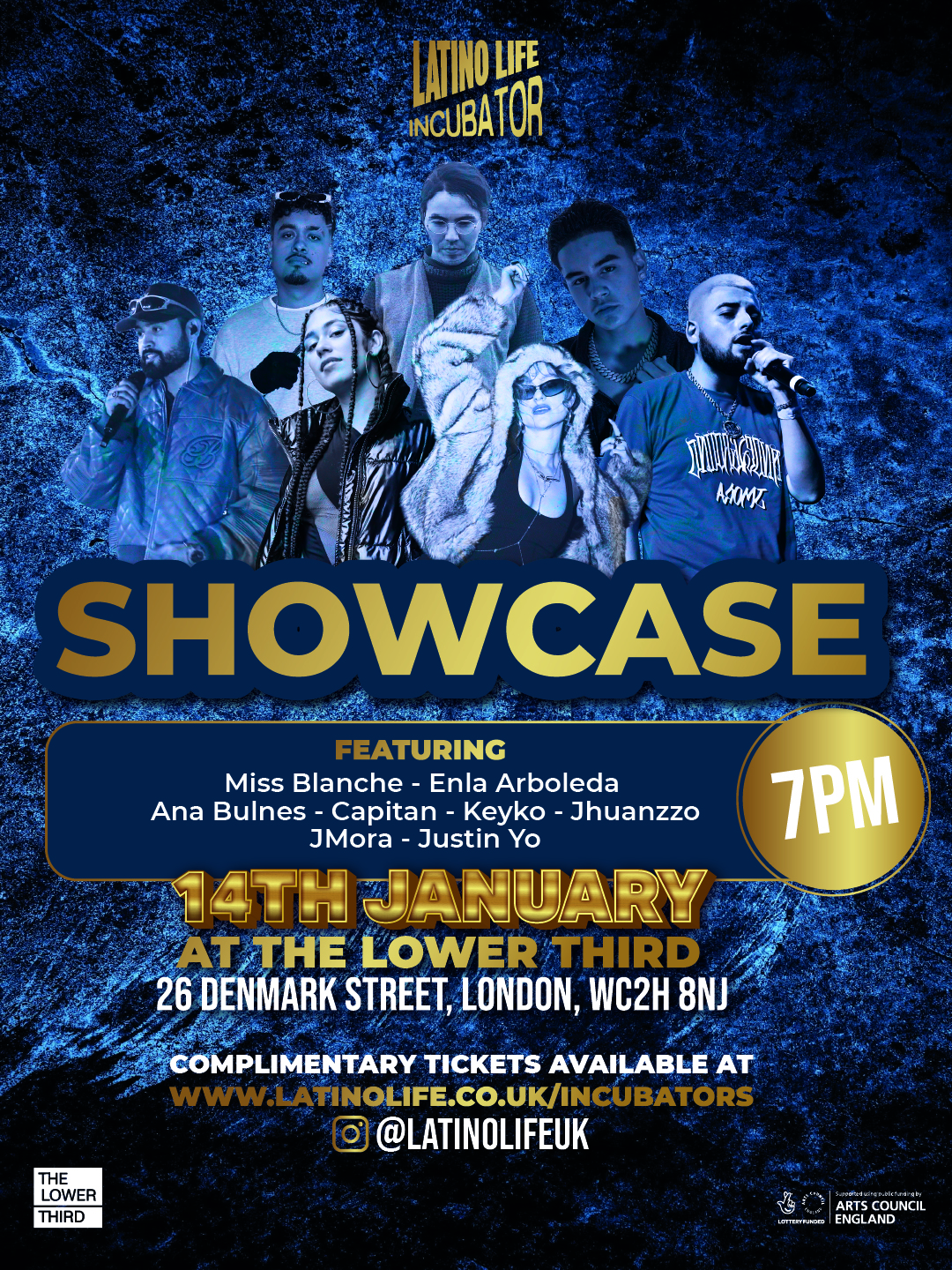To enter Ryan Castro’s backstage dressing room is to enter a little piece of Co-lombia. Showing his tour manager the Bon Bon Bums and Chocoramos layed out on the table next to him, he enthuses ’In Colombia you can get these in every shop everywhere!’ The typical cakes and sweets of a Medellin kiosko ev-idently fill the paisa with happiness and nostalgia while he is on his world tour.
Castro’s attire of choice for his UK debut - a grey tie-dye co-ord with matching grey bucket hat and of course a pair of black Air force - chimes with the London look and his blacked out shades and iced-out gold add the reggaetonero spark. But it’s the ring with his name on it that leaves no doubt where Ryan Castro Comes from. I mean, if you don't have a piece of self-branded jewellery…are you even Colombian?
‘So,’ I ask provocatively, alluding to the ring. 'Who is Ryan Castro?'
“Ryan Castro is an artist from a poor barrio in Medellin, Colombia,” he answers simply. “To be completely honest, not poor in the sense that people don’t have anything, but poor in the sense that there aren't much opportunities for young people,” he qualifies. “I grew up around a lot of violence, a lot of gang violence. It was normal to hear gunshots, to see people getting robbed, so it is really hard for a young person.”

Behind the bling, I can see already, radiates humility, modesty and a humanity unusual for a new superstar.
“Fortunately, I was able to overcome those difficulties,” continues the boy whose song Mujeriego (Womaniser) sound has nearly two million video creations. “I started by walking about with my little speaker and singing and show-ing my songs to my friends and that was the start of my story, I would make songs for las barbies, if there was a girl that I liked and I wanted her to like me, I would make her a song, things like that. It was from the streets that I learnt about music."
To think that this superstar was once singing on local buses trying to make a liv-ing for himself, leaves me in awe. Coming from Colombia myself, I know the daily challenges faced on every corner, and how easy it is to go down the wrong path. This is why this boy from Pedregal (a notorious Medellin neigh-bourhood) is inspiring young Colombians.
Indeed, Castro has proved especially attractive for those who do not feel like they can connect with the out-of-reach stars like Maluma and J Balvin, also from Medellin. They can relate to him and his story of getting out of the ghetto and to create a better life for himself. It's rare to find a reggaetonero who has this kind of positive impact on the youth, and I tell him so.
"Honestly I feel really happy if this is the case, because I am proud of my story so it's beautiful to know that someone can say that they overcame something because of me or feel inspired even if they are not an artist themselves. To know my career and my life has served for a higher purpose to help build their future is amazing. At the same time, with that comes great responsibility, be-cause if I do something wrong people are going to say ‘so and so did something bad because they saw Ryan Castro do it.’ But I don’t mind the responsibility be-cause I feel it’s my mission as an artist to not just take my music but also to show people that there are many ways to move forward in life, not through doing bad things."
A lot of young people feel they don’t have many options in life, I insist. At the same time, it’s a great moment for Medellin - once only known abroad as the home of Pablo Escobar and now widely considered to be one of the most powerful music cities in the world, the mecca for reg-gaetón production outside San Juan and Miami.
"Amen Amen, I agree, Colombia has been a very violent country and we are associated with really negative things. Coming from a really brutal barrio, to go around the world with a different, more positive message fills me with great pride and I feel a sense of responsibility carrying my flag. I’m tired of hearing 'Oh your Colombian, ha ha…Pablo Escobar.’ I want people to say 'Oh your Co-lombian, Ryan Castro, Maluma, J Balvin or Karol G or Blessd’, who is my good friend. This makes me feel good."
The fact that Castro openly praises other Colombian artists, not just famous ones, who he says “may not even have social media but are very good singers and producers and are working hard with a lot of love and re-spect”, betrays a grace and generosity that Colombians have in abun-dance. The solidarity also brings to the fore the qualities of poor neigh-bourhoods that the media often ignore. Castro was just one of many other kids from the ghetto with a dream, influenced by hip-hop, but for whom the success of reggaetón worldwide brings the dream closer.
”I had many inspirations, I would watch a lot of movies about rappers from the USA, I would see 50 Cent, Eminem, those type of artists, but I didn't know English, I mean I would listen to their music and vibe to it but I didn't know what they were saying. So when reggaeton came about it was a similar flow and style….the chains, the sunglasses, the clothes they would wear, so I started to understand it all a bit more, that was my mo-tivation. In reality my journey in music really started when I was writing about my story, my life, from what I would see in the ghetto, about the ladies, about my love life, but I was really influenced by reggaetón from Puerto Rico."
Initially, Castro’s strategy consisted of uploading his music to YouTube and SoundCloud with no marketing plan. As his music got around locally, he landed on the radar of renowned Colombian artist Kevin Roldan, who he credits as being the first artist to support his music. But while he’s now built a team around him, he insists he still believes in the human factor rather than the numbers.
“I’m interested in collaborating with artists that have feeling, where I can sit with you in the studio and get to know you, not just just business purposes, which is uncomfortable: like ‘oh let’s hit up so-and-so artist because of the numbers they have.’ I almost rarely like to make music for those reasons. First I need to have some sort of relationship with the artist, I don't care if they are famous or not, first I need to feel their vibe.”
Always respectful of other artists, Ryan doesn’t really do fandom, instead he focuses his energies on believing in himself rather than envying or aspiring to be someone else.
"Being completely honest, I am a huge fan of my songs, I believe a lot in myself and in my music and I love what I do. I don't let myself be guided by thoughts like 'I'm going to make this song so that it goes viral,' I make music that I genu-inely like because I think ‘if I like it, I know the people are going to like it’ and it's worked for me.”
The ultimate impression one gets, is Ryan’s gratitude for and excitement about the journey he is embarking on.
“I would like to travel the world and till today I haven't done an album yet so I am working on an album. I also want to work with upcoming artists, because my career has been very independent, thank God you know, a lot of my songs is just me on the track and they have done really well, so now I want to work and get to know more artists, like artists from Puerto Rico who brought us the genre of reggaetón. So you can expect a lot. This is just beginning.”
As for the travelling, previously denied a visa to perform in the UK, Castro finally made it for his debut UK show in Brixton, where we are now. I as-sure him he has a huge fan base, that he will soon see when he gets on stage.
"Amen, Amen,” he answers, the gratitude genuinely oozing. ”I feel really comfortable here and really grateful, I was literally talking to my team in the car and it really is a big opportunity to be here. We were in the car listening to songs that I made about five or six years ago and we were saying like wow, we are here in London listening to them, so far away from home and to feel the support from the Latinos in London makes it a really special moment for me."
Unlike many US or Latino musicians who come to the UK, Castro shows a keen awareness of the local music scene.
“When we were on our way here were were listening to the radio in the car and I love how much dancehall they play here in London. I know there is a major influence of Caribbean and African sounds and we were com-paring the similarities we have between Latin Caribbean and African sounds. I know I’m going to fall in love with the Latino scene here in Lon-don."
As we wrap up the interview, Ryan’s tour manager bursts in with a huge smile on her face. "I've got great news! We sold out!" Ryan Castro's smile fills the en-tire room and I looked at him and say "I told you it was going to be filled with all your fans." He spuds me, confirming his endearing combination of gratitude and self-belief that has captured the hearts of his followers.
"Amen Amen.”


















